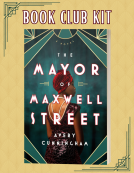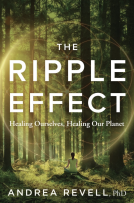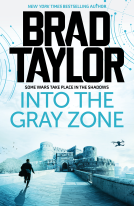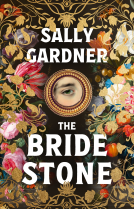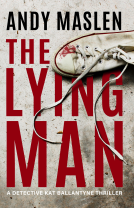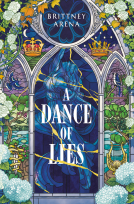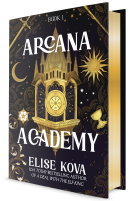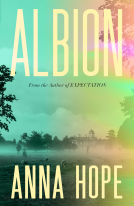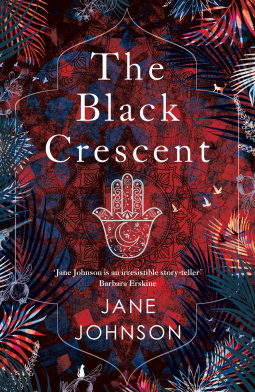
The Black Crescent
by Jane Johnson
This title was previously available on NetGalley and is now archived.
Send NetGalley books directly to your Kindle or Kindle app
1
To read on a Kindle or Kindle app, please add kindle@netgalley.com as an approved email address to receive files in your Amazon account. Click here for step-by-step instructions.
2
Also find your Kindle email address within your Amazon account, and enter it here.
Pub Date Aug 03 2023 | Archive Date Aug 09 2023
Head of Zeus | Apollo
Talking about this book? Use #TheBlackCrescent #NetGalley. More hashtag tips!
Description
Bringing 1950s Morocco vividly to life, Jane Johnson's masterful new novel, The Black Crescent, is a gripping story of murder, magic and divided loyalties...
Hamou Badi is born in a mountain village with the magical signs of the zouhry on his hands. In Morocco, the zouhry is a figure of legend, a child of both humans and djinns, capable of finding all manner of treasure: lost objects, hidden water.
But instead, Hamou finds a body.
This unsolved murder instils in Hamou a deep desire for order and justice: he trains as an officer of the law, working for the French in Casablanca. But the city is trapped in the turmoil of the nationalist uprising, and soon he will be forced to choose between all he knows and all he loves...
Praise for Jane Johnson:
'An irresistible story-teller' Barbara Erskine
'Page-turning stuff' The Times
'Jane Johnson writes with such grace' Carol Drinkwater
'Beautifully written' Mail on Sunday
'Johnson writes the sort of books you want to tell everyone about' Katie Fforde
Available Editions
| EDITION | Ebook |
| ISBN | 9781804546192 |
| PRICE | £8.99 (GBP) |
| PAGES | 400 |
Available on NetGalley
Featured Reviews
 Mary H, Reviewer
Mary H, Reviewer
A moving account of Hamou, the lead character in this novel, that shows his gradual disillusionment with the French, after they occupied Morocco, even though he works for them as a police officer. What he does about this conflict I will not reveal because it would spoil the novel.
Sights, sounds and flavours of food are well described in the novel, indeed, the imagery is masterful. Thank you Jane Johnson for an excellent read, which is highly recommended.
 Liz B, Reviewer
Liz B, Reviewer
This novel is about a time that I know very, very little about - the French occupation of Morocco in the 1950s - and is told through the point of view of Hamou, a young man born in the mountains who was born with magical signs on his hands that mark him out as a zouhry which is a legendary figure, a figure of both the humans and the djinns capable of finding lost things, including water. Hamou trains to be an police officer for the French in Casablanca and the story documents his divided loyalties as he sees the grandeur of the French against the poverty of the Muslim people. How he watches the discrimination in dealing with crime, how the Muslim people are often treated harshly and in some cases dismissed. During this time there is growing conflict between the Muslim people and their occupiers and we feel Hamou's dilemma, there are brutal scenes. Hamou is a likeable character and there are some amusing touches amid the conflict when he is trying to side-step his mother's attempts to arrange a marriage for him. There are also some pretty harsh scenes when he is caught between his duty as an officer of the law and his loyalty to his people. How he resolves this dilemma, I will not spoil for you. Much was made of him being a zouhry and I did initially think that there would be some elements of magical realism in here, but there was not. Hamou downplays this 'power' but we do see how it not only gains him some respect in his community but sometimes causes him to be asked to use his 'power' especially in the second half of the book. A good read.
this book is a very well written tale of a young man's experience of the French occupation of Morocco in the 1950s; how he deals with his fight to survive and how it can clash with his own morality.
I really liked this book; it provided me a new insight on a topic and time period I know very little about and was fascinating to read!
I'd recommend this book to anyone interested in both this time period and the intricacies of the dynamic between the Muslim peoples and the French occupiers of Morocco in this time :)
This book is set in Morocco, before and around the end of the French occupation / colonisation. I knew nothing about this time, and it made me want to know more. The characters are interesting and charming and making compromises, deals and doing their best. Hamou Badi is a complex, interesting and sympathetic main character, doing the best he can to balance his obligations and desires.
No spoilers, but there is a plot point that entirely feels like it is only there to make the book take a sharp turn, and it felt false, which is a shame, because everything before it - and what comes after feels more natural. The overarching plot and all the many sub-plots come together nicely.
One of the things I appreciated about this book was the complexity with which colonisation is considered. it was an enjoyable read, and now I'm going to go find out more about the French in Morocco.
Thanks to NetGalley and the publishers for giving me a free e-Arc in exchange for an honest review.
 Douglas O, Reviewer
Douglas O, Reviewer
I wasn’t sure about reading this book based in 1950s Morocco but was immediately captured. The context of the period is used to excellent effect. The man character is Hamou who grows up as a native in his country but when the French take over his country he joins their police force. That is an unpopular move and causes him endless reflection on whether he has betrayed his origins. He becomes a potential target for the terrorist opposition group, the Black Crescent, with whom a woman he desires is involved. He has no idea what will happen to him when the French colonists decide to leave. This s an outstanding read and I recommend it.
I was completely taken in to the world of this book and the lives of it's characters. Set in 1950's French occupied Morocco this is an intricate story that explores the complex trauma of life under occupation. I knew very little about the history but now I am keen to know more.
The characters are well drawn, it felt vivid and real. Jane Johnson has crafted a novel that delves deep in to family relationships with such honesty (all that love, loyalty and irritation). There a deep sense of home and how it shapes us, draws us in. It's a murder mystery and a love story with a little bit of magic. Highly recommend.
Read The Black Crescent if you loved these books:
1. The White Tiger, Aravind Adiga
2. The Red Tent, Anita Diamant
This book is about the French occupation of Morocco and goes into the history well, following a Moroccan man born in a rural fictional area. In a time of great civil unrest towards the end of the colonial rule, he deals with a myriad of moral dilemmas as a result of working for the French imposed police force.
The plot was interesting and well researched. A little slow in the middle, but this picks up towards the latter half of the book. Overall a great read!
First, I would like to thank the author & NetGalley for the eARC opportunity. Like always, this review is voluntary & honest
I enjoyed reading this book even though I did struggle slightly in the middle.
They were strong characters and world building, and an interesting storyline (well researched)
Hamou was full of empathy and curiosity, which I loved 😁
It was very exquisite and full of history, I have never read anything like it before.
You had
- Murder
- historical fiction
- magical marks
- mystery
 Stacey C, Reviewer
Stacey C, Reviewer
"He was a creature between two worlds, who didn't fit anywhere at all."
The Black Crescent is about a young man living in French occupied Casablanca during the 1950's. This was an area of history I knew absolutely nothing about and I was impressed by the way Johnson's sharp imagery helped me, the reader, to picture the scenes playing out on the page before me.
Hamou Badi grew up in the small mountain village of Tiziane. A traditional village where the natural and the supernatural combine, where djinns and amulets are not merely myths and legends, but aspects of daily life.
Hamou is a bit of a rebel, a big fish in a small pond, until the day he discovers a woman's body whilst out on a walk with his younger cousin Moha. The authorities reaction to this discovery set Hamou on course to pursue justice for the rest of his life.
In 1955 Hamou is living in a rented room in Casablanca, relying on his kind neighbours for food, and on the French occupiers for income.
"He was Hamou Badi - gangleader, fruit-stealer, unhobbler of the donkeys, catapult-maker and general promoter of chaos- and he resented the French who occupied his country with a passion. And now here he was, paid to keep order for the very regime he had so disliked. French money was sent home to his mother, French money paid for his rent, his cigarettes, his visits to the cinema, for his tea, his food, his clothes, his newspapers and his radio, everything that made his life worth living."
During the course of the book, the tension between the French and the Morrocans mounts and the resulting fallout makes for one hell of a book.Hamou's story has all the more impact because he feels himself at war between the two sides.
"You know, Hamou, you stand with a foot in worlds that are moving further apart by the day. Sooner or later, you'll have to come down on or the other you'll find yourself falling between them."
Hamou's story was an incredible one, not one I will soon forget.
 Steven M, Reviewer
Steven M, Reviewer
Great read.
Set during the 1950s at the time of the Moroccan struggle for independence from French colonial rule.
The main character, Hamou Badi seeks to balance his role as a member of the police force, by providing an income for his mother and sisters, without being seen to collaborate with the French..
He tries to remain true to his Moroccan heritage and values, in a country moving into an increasingly modern world.
He has several conflicts of conscience as he sympathises with those rebelling against an increasing brutal French regime whilst trying to uphold the law.
In her Author Note, Jane Johnson writes, ‘I love to learn when I write fiction, and I hope readers will enjoy learning alongside me.’ I certainly did. Although I was aware of a French influence in the history of Morocco, I knew nothing about the extent of French control over the country and, in particular, the period of unrest that followed the exile of the Sultan of Morocco in 1953. Nor was I aware of the brutal actions taken by the French authorities to suppress the independence movement, some parts of which (like the fictional Black Crescent of the title) turned to increasingly violent measures.
Hamou Badi is our witness to these events, events he views with increasing horror. ‘Violent deaths became a daily occurrence. Regime collaborators killed by nationalists. Nationalists executed by the authorities. Moroccan activists killed by settlers. Settlers murdered by terrorists.’ He struggles with a growing sense of complicity; he joined the French police force out of a desire to do good but finds his integrity increasingly compromised.
Hamou comes to epitomise a person caught between two worlds and two identities. As he observes, ‘There it was, he was alone again, stranded in that no-man’s land between the rock of the French regime and the hard place inhabited by his own people.’ That there will come a breaking point seems unavoidable and when it does, it has devastating consequences.
Hamou is a solitary, self-effacing person making him an entirely sympathetic character. His innate sense of justice and humanity shines through everything he does. For instance, the kindness he shows towards Didi, a young beggar. And his instinctive desire to help those in trouble will reap rewards at crucial points.
Although there are brutal scenes at some points in the story, there’s also humour particularly towards the end of the book as Hamou takes up a new role and is presented with some tricky problems to solve. There was even a laugh out loud moment, which rarely happens for me.
The author’s love for Morocco, its people and its culture is evident throughout the book. (You can read about her very special – and romantic – connection with the country on her website.) In particular, there are wonderful (and mouth-watering) descriptions of the food of Morocco but also of its landscape, architecture, traditions, social and religious customs and rich history. The strong sense of community in which ties of blood are of particular importance is exemplified by Hamou’s family. But there is also a sense of change in the air, a transition from old ways to more modern ways, with some things lost in the process but others gained.
I’ve enjoyed all the books I’ve read by Jane Johnson – Court of Lions, The Sea Gate and The White Hare – but I think The Black Crescent is her best yet. It had everything I look for in historical fiction: a fascinating period setting, an engaging central character and a compelling story line that transported me to a different time and place. And, for me, it had the perfect ending.
 Andrea K, Reviewer
Andrea K, Reviewer
Thank you NetGalley for providing me the eARC.
This book is about French occupation of Marocco. We follow a zouhri Hamou Badi and his life and the moral dilemmas which he has as he works for thr French police.
I liked this story a lot, I have enjoyed following Hamou and his relatives and friends even through the rough times. The book is slow going, but it did not bother me at all.
4 stars and totally recommend to everybody who loves historical fiction
 Reviewer 854813
Reviewer 854813
3.5. This was an interesting story about a period of history that I knew nothing about. Definitely made me interested in picking up a history book about it. Enjoyed it!
 Mary + Gerry M, Reviewer
Mary + Gerry M, Reviewer
As a child in his native Moroccan mountain village, Hamou Badi stumbles across a corpse dumped unceremoniously by a dried-up river bed. It's a random event which influences his life, for his desire to give this dead person some dignity and justice leads him, later in life, to join the Surete, the police force of the French colonialists who rule the country.
He hopes this way he can help people and make things better for them but as the 1950s progress, Moroccan demands for freedom become more violent and the French response increasingly aggressive and ruthless. Hamou is caught between the two, in a position which is rapidly becoming untenable.
It's also a love story, with Hamou finding himself in a similar quandary. His mother prefers the old traditional ways to make a match for her son - to talk to her neighbours, and find a suitable bride, whereas Hamou finds himself attracted to the daughter of his Casablanca neighbours, a modern relatively independent women, working as a nurse, and running dangerous errands at night.
The Black Crescent is definitely a page-turner of a read, set in a period of comparatively recent history about which I suspect most readers will know little.
With input from her Moroccan husband, the author has crafted an incredibly atmospheric novel capturing the sights of sounds of 1950s Morocco from ancient hill village where life seems quiet and almost unchanged in hundreds of years to the modern bustle of Casablanca, from the crowded older parts of the city where the poorest workers live, to the luxurious seaside villas of the French colonialists.
Fascinating story of murder, magic and mystery set against a back drop of newly French occupied Morocco. Hamou is a lovely character full of integrity and empathy for those he meets, torn by his job with the brutal French regime.
My thanks to Head of Zeus Apollo for an eARC via NetGalley of ‘The Black Crescent’ by Jane Johnson.
Morocco, 1939. The novel opens in the mountain village of Tiziane where eleven years previously Hamou Badi had been born with the magical signs of the zouhry on his hands. In Morocco, the zouhry are figures of legend, a child of a human and a djinn, believed capable of finding all manner of treasure: lost objects, hidden water. Yet instead,
Hamou finds a body….
The unsolved murder haunts him and instils in the young Berber a deep desire for order and justice. A few years later he trains as a police officer. In 1955 he is working for the French-run police force in Casablanca, sending money home to his mother in Tiziane while fending off her attempts to find him a suitable wife.
Hamou finds himself caught up in the increasing turmoil of the resistance and the fight for Moroccan independence; realising that soon he will be forced to choose between his position and his love for his country and its peoples. The Black Crescent of the title is an organisation that is taking direct, often violent, action against the French.
I have enjoyed a number of Jane Johnson’s novels over the years and this latest one was superb. In her Author’s Note she provides background on her inspirations, including the stories told to her by Abdel, her husband, about the experiences of his family and friends in the 1950s as well as his own in Casablanca. She also lists some nonfiction sources about this period of Moroccan history.
She mentions her decision to have Hamou Badi bear the marks of the zouhry, bringing a touch of magic and folklore into the story. I had never heard of this particular legend and appreciated how well Johnson had incorporated it into the narrative.
Animals feature prominently in the novel including Hamou’s mule, Makouda, and the black cat he rescued, Madani, who pretty much does what cats do all over the world and soon has Hamou at their beck and call. Madani seemed a fitting companion for a suspected zouhry.
Overall, I found ‘The Black Crescent’ an excellent novel that also served to inform me about this period of Moroccan history as well as the rich culture of the region. It has moments of tragedy as well as hope, humour, and even a touch of romance. Jane Johnson’s writing is rich in description and it was very easy to feel transported in time and place.
Highly recommended.
 Vanessa W, Reviewer
Vanessa W, Reviewer
Set in 1950s Morocco, Hamou Badi begins life in the mountain village of Tiziane. He has the magical signs of the zouhry on his hands. One day he discovers a body, obviously a murder but it remains unsolved. This leads him to becoming a policeman in Casablanca which is occupied by the French. All Hamou wants to do is help people but as the nationalist uprising grows, he finds himself on the wrong side of the law.
I know very little, if anything, about Moroccan history so this story was quite an eye opener. It was fascinating to learn about the era, customs and the cuisine. It was very vividly described and depicted, so much so I almost felt I was there and could nearly taste the food. I loved Hamou, he was such a great character. Even the delightful cat, Madani, played a strong role. I enjoyed following their journeys and Hamou’s trials and tribulations. It’s very much a page turner, quite the adventure story. I highly recommend this gripping, compelling and, may I say it, educational read.
 Sumaira M, Reviewer
Sumaira M, Reviewer
Thank you to NetGalley for sending me an ARC copy of this book to review.
This was an absorbing an atmospheric book – I really enjoyed seeing 1950’s Morocco come to life. I knew little about the French occupation of Morocco before reading this book so this was a real eye opener for me. I thought Hamoud has the main character worked really well – his character certainly had a lot of depth and exploring his divided loyalties and inner conflicts as the book progressed was interesting. I have not read anything by this author before but I really enjoyed her writing style and the way she subtly built tension throughout. Overall would highly recommend!
Readers who liked this book also liked:
Silvia Moreno-Garcia
Historical Fiction, Literary Fiction, Sci Fi & Fantasy
Dr. Andrea Revell
Health, Mind & Body, Nonfiction (Adult), Religion & Spirituality
Kelly and Kristina Mancaruso
General Fiction (Adult), Mystery & Thrillers, Nonfiction (Adult)



